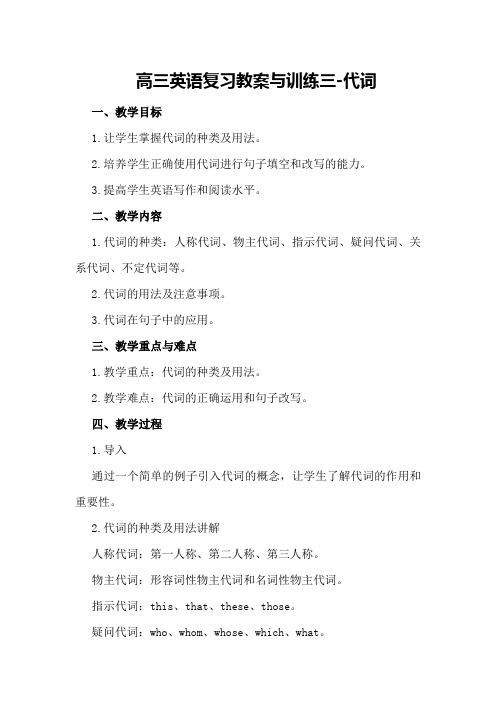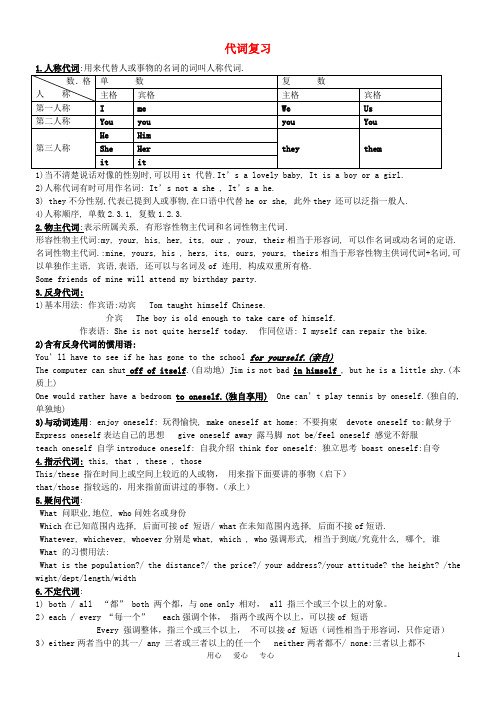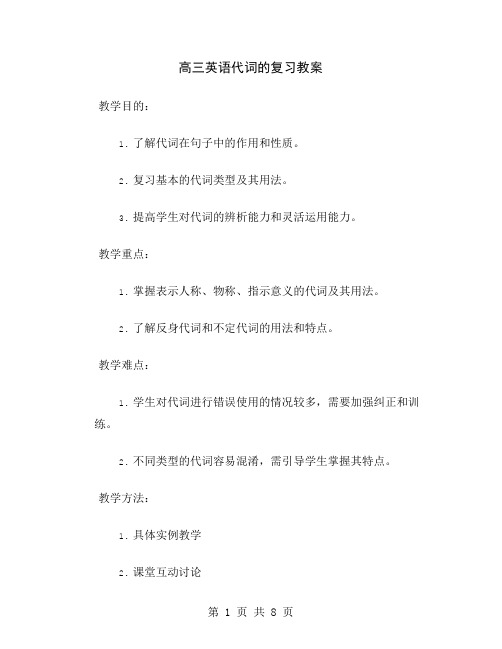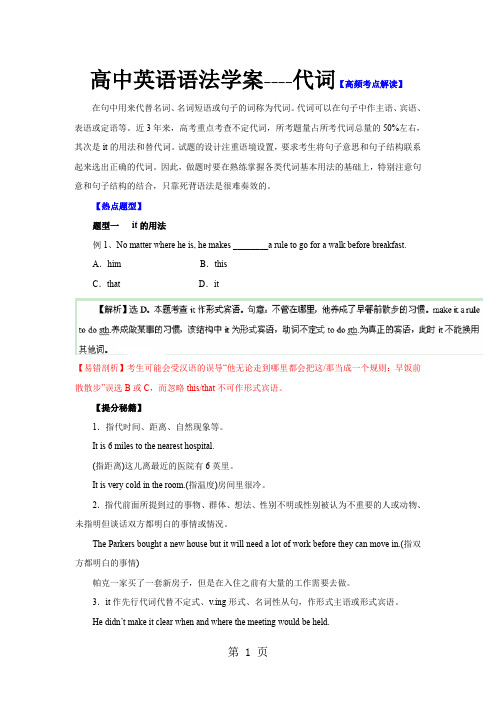(完整版)高中语法复习学案教师版——代词
高三英语复习教案与训练三-代词

高三英语复习教案与训练三-代词一、教学目标1.让学生掌握代词的种类及用法。
2.培养学生正确使用代词进行句子填空和改写的能力。
3.提高学生英语写作和阅读水平。
二、教学内容1.代词的种类:人称代词、物主代词、指示代词、疑问代词、关系代词、不定代词等。
2.代词的用法及注意事项。
3.代词在句子中的应用。
三、教学重点与难点1.教学重点:代词的种类及用法。
2.教学难点:代词的正确运用和句子改写。
四、教学过程1.导入通过一个简单的例子引入代词的概念,让学生了解代词的作用和重要性。
2.代词的种类及用法讲解人称代词:第一人称、第二人称、第三人称。
物主代词:形容词性物主代词和名词性物主代词。
指示代词:this、that、these、those。
疑问代词:who、whom、whose、which、what。
关系代词:who、whom、whose、which、that。
不定代词:some、any、every、no、all、both、neither、either、none、one、ones、other、another、somebody、anybody、nobody、everybody、somebody、anybody、nobody、everybody等。
3.代词用法举例分析通过例句让学生了解不同代词的用法和注意事项。
4.代词练习设计一些代词填空题和改写句子的练习,让学生在实际应用中巩固所学知识。
五、教学实例1.导入实例A:What'sthis?B:Thisisabook.2.代词用法实例人称代词:Heismyfriend.物主代词:Thisismybook.指示代词:Thatisapen.疑问代词:Whoishe?关系代词:Themanwhoisstandingthereismyteacher.不定代词:Somebodyisknockingatthedoor.3.代词填空题实例Ihave__________friends.__________ofthemareverykindtome.Ilike__________verymuch.4.改写句子实例原句:Hegavemeabook.改写:Hegave__________abook.六、教学评价1.课后作业:布置一些代词相关的练习题,让学生巩固所学知识。
高中英语家教备课资料 高中英语基础语法第六课:代词

代词是代替名词及起名词作用的短语或句子的词一、人称代词指代人事物的代词。
主语,宾语,表语It:①代替前文已出现的名词;②表示性别、身份等无法确认或说明的人事物;③时间、季节、气候、距离等抽象名词;④形式主语或形式宾语;⑤一些习惯用法,it本身无意义make it成功⑥强调句:it's ..... that ......Working hard makes you succeedIt is working hard that makes you succeedIt is you that working hard makes succeed二、物主代词物主代词是表示所有关系的代词,用来说明某物属于某人或与某人有关。
形容词性物主代词只作定语,名词性物主代词可作主语、宾语、表语、连用of作定语三、反身代词宾语、同位语、表语1、作宾语时,主语和宾语是同一个/群人he enjoy himself只能接反身代词作宾语的特殊及物动词:absent-------absent oneself from activity/...Avail---------avail oneself of 利用Pride---------pride oneself on (doing) sth自豪于2、作表语时,反身代词用来描述感觉、情绪和状态。
Be oneself feel oneself3、作主语或宾语的同位语时,表‘亲自’,用于加强语气,放在被修饰名词后或句末一个名词(或其它形式)对另一个名词或代词进行解释或补充说明,这个名词(或其它形式)就是同位语。
同位语与被它限定的词的格式要一致,并常常紧挨在一起。
同位语除表示其同位成分的全部意义外,还可以表示部分意义。
(考点主要是同位语从句,后续展开)常见用法:by oneself 亲自;独自enjoy oneself 玩得开心come to oneself恢复知觉dress oneself 自己穿衣服devote oneself to致力于speak to oneself 自言自语teach oneself 自学help oneself to 随便吃in oneself 本身固有四、不定代词不明确指代某个人、某个事物、某些人、某些事物的代词(1)some、any的用法(2)few,a few,little,a little的用法(3)other,the other,others,the others,another的用法(4)all,both,none,either,neither的用法注:①each可用干两者、三者或三者以上,而every只用干三者或三者以上②all和each既可单独使用,也可后接名词,还可后接of短语;而every后必须接名词,既不能单独使用也不能后接of短语③不定代词all,every 等与 not 连用时构成部分否定;若要表示完全否定,则需换用 none,neither, no one等。
高考英语 语法复习:代词教案

代词复习2)人称代词有时可用作名词: It’s not a she , It’s a he.3) they不分性别,代表已提到人或事物,在口语中代替he or she, 此外they 还可以泛指一般人.4)人称顺序, 单数2.3.1, 复数1.2.3.2.物主代词:表示所属关系, 有形容性物主代词和名词性物主代词.形容性物主代词:my, your, his, her, its, our , your, their相当于形容词, 可以作名词或动名词的定语. 名词性物主代词.:mine, yours, his , hers, its, ours, yours, theirs相当于形容性物主供词代词+名词,可以单独作主语, 宾语,表语, 还可以与名词及of 连用, 构成双重所有格.Some friends of mine will attend my birthday party.3.反身代词:1)基本用法: 作宾语:动宾 Tom taught himself Chinese.介宾 The boy is old enough to take care of himself.作表语: She is not quite herself today. 作同位语: I myself can repair the bike.2)含有反身代词的惯用语:You’ll have to see if he has gone to the school for yourself.(亲自)The computer can shut off of itself.(自动地) Jim is not bad in himself , but he is a little shy.(本质上)One would rather have a bedroom to oneself.(独自享用)One can’t play tennis by oneself.(独自的,单独地)3)与动词连用: enjoy oneself: 玩得愉快, make oneself at home: 不要拘束 devote oneself to:献身于Express oneself表达自己的思想 give oneself away 露马脚 not be/feel oneself 感觉不舒服teach oneself 自学introduce oneself: 自我介绍 think for oneself: 独立思考 boast oneself:自夸4.指示代词: this, that , these , thoseThis/these 指在时间上或空间上较近的人或物,用来指下面要讲的事物(启下)that/those 指较远的,用来指前面讲过的事物。
高三英语代词的复习教案

高三英语代词的复习教案教学目的:1.了解代词在句子中的作用和性质。
2.复习基本的代词类型及其用法。
3.提高学生对代词的辨析能力和灵活运用能力。
教学重点:1.掌握表示人称、物称、指示意义的代词及其用法。
2.了解反身代词和不定代词的用法和特点。
教学难点:1.学生对代词进行错误使用的情况较多,需要加强纠正和训练。
2.不同类型的代词容易混淆,需引导学生掌握其特点。
教学方法:1.具体实例教学2.课堂互动讨论3.个人和小组练习教学内容:第一部分:代词的作用和性质1.代词的基本作用:代替名词,在句子中充当名词的作用,避免重复。
例如:Li Ming loves his dog. He plays with his dog every day. (名词繁琐重复)Li Ming loves his dog. He plays with it every day. (代词避免重复)2.代词的性质:除了不定代词外,其他代词都具有用法限制,是一类具有特殊用法的词汇。
例如:You shouldn’t use “ he ” to refer to a female.(他不能用来指女性)第二部分:代词的分类和用法1.人称代词人称代词是代替人名或代替人类或其他动物时使用的代词。
包括第一人称(I, we, me, us), 第二人称(you), 第三人称(he, she, it, they)。
例如:He is a student. (他是学生)They are from America.(他们来自美国)注意:1.第三人称代词在性别、人和数方面有所不同,需要注意使用。
例如:This is my sister and I love ____.(her) (不是我)This is a car. ____ is very fast. (It)2.I 和 me 的用法我与我之间,用 I;我与人之间,用 me。
例如:John and ____ are good friends.(I)(我和 John 很好)This is a present for you and ____ . (me) (给你和我的礼物)3.物主代词物主代词用来表示“谁的”,即代表物主的名(代)词。
高三英语语法复习教案:代词

高三英语语法复习教案:代词1. 什么是代词代词是指代名词或名词词组的词类,可以替代名词在句子中担任指代作用。
代词分为人称代词、指示代词、反身代词、关系代词、不定代词和疑问代词等。
2. 人称代词人称代词是用来代替人或事物的代词,根据代指人的身份不同,分为第一人称、第二人称和第三人称。
2.1 第一人称代词第一人称代词是指在语言中用于指代说话者自己的代词,如:I(我)、we(我们)。
使用时需要注意使用时态的一致性,如:•I am a teacher.(我是一名教师。
)•We are students.(我们是学生。
)2.2 第二人称代词第二人称代词是指在语言中用于指代对话中的另一个人或对象的代词,如:you(你、你们)。
使用时需要注意敬称的使用,如:•You are a good student.(你是一个好学生。
)•You all did a great job.(你们都做得很好。
)2.3 第三人称代词第三人称代词是指在语言中用于指代除说话者和对话者以外的第三个人或事物的代词,如:he、she、it(他、她、它)。
使用时需要注意名词单复数、性别以及代词与先行词的一致性,如:•He is a doctor.(他是一名医生。
)•She likes to read books.(她喜欢读书。
)•It is a cat.(这是一只猫。
)3. 指示代词指示代词是指在语言中用于指示或代替特定事物或人的代词,分为this、that、these、those等。
使用时需要注意使用的位置以及指代的范围,如:•This is a book.(这是一本书。
)•Take those pencils over there.(拿那边那些铅笔。
)4. 反身代词反身代词是指强调动作或状态的主体是它本身,比如myself、yourself、himself、herself、itself等。
使用时需要注意反身代词的位置,如:•I hurt myself.(我让自己受伤了。
高三英语语法复习教案:代词

高三英语语法复习教案:代词一、教学目标1.理解代词的定义和分类2.掌握代词的用法和注意事项3.提高学生在句子和篇章中正确使用代词的能力二、教学内容1.代词的定义和分类2.代词的用法3.代词的注意事项三、教学过程Step1:导入(5分钟)1.引导学生回顾已学过的代词知识,如代词的定义、分类和用法等。
2.提问学生关于代词的注意事项,激发学生的学习兴趣。
Step2:讲解代词的分类(10分钟)1.讲解人称代词、物主代词、反身代词、指示代词、不定代词和疑问代词的分类。
2.用例句展示各类代词的用法,让学生理解并区分它们。
Step3:讲解代词的用法(15分钟)1.讲解代词在句子中的作用,如主语、宾语、表语等。
2.举例说明代词在特定语境中的用法,如固定短语、习语等。
3.分析代词在句子中的省略现象,如人称代词的省略等。
Step4:讲解代词的注意事项(10分钟)1.强调代词的单复数、性别和数的一致性。
2.提醒学生注意代词的词义和语境搭配,避免混淆。
3.讲解代词的常见错误,如误用、漏用等,并给出相应的例句。
Step5:练习与巩固(10分钟)1.给出不同类型的练习题,让学生填空、改错、翻译等。
2.引导学生进行小组讨论,共同解决问题。
3.选答学生回答,给予及时的反馈和讲解。
2.提醒学生代词在实际应用中的重要性,鼓励他们在日常学习中多注意代词的用法。
3.给出拓展任务,如查找代词的资料、完成相关练习等。
四、教学评价1.课堂参与度:观察学生在课堂上的发言和互动情况,了解他们的学习状态。
2.练习完成情况:检查学生完成的练习题,评估他们的掌握程度。
3.课后反馈:收集学生的课后反馈,了解他们对代词知识的理解和应用情况。
五、教学资源1.PPT课件:展示代词的分类、用法和注意事项等。
2.练习题:提供不同类型的练习题,巩固代词知识。
3.参考资料:为学生提供相关的参考资料,拓展他们的知识面。
六、教学建议1.针对不同学生的学习水平,可以适当调整教学内容和难度。
高考英语语法 代词 学案-16页word资料

高中英语语法学案----代词【高频考点解读】在句中用来代替名词、名词短语或句子的词称为代词。
代词可以在句子中作主语、宾语、表语或定语等。
近3年来,高考重点考查不定代词,所考题量占所考代词总量的50%左右,其次是it的用法和替代词。
试题的设计注重语境设置,要求考生将句子意思和句子结构联系起来选出正确的代词。
因此,做题时要在熟练掌握各类代词基本用法的基础上,特别注意句意和句子结构的结合,只靠死背语法是很难奏效的。
【热点题型】题型一it的用法例1、No matter where he is, he makes ________a rule to go for a walk before breakfast.A.him B.thisC.that D.it【易错剖析】考生可能会受汉语的误导“他无论走到哪里都会把这/那当成一个规则:早饭前散散步”误选B或C,而忽略this/that不可作形式宾语。
【提分秘籍】1.指代时间、距离、自然现象等。
It is 6 miles to the nearest hospital.(指距离)这儿离最近的医院有6英里。
It is very cold in the room.(指温度)房间里很冷。
2.指代前面所提到过的事物、群体、想法、性别不明或性别被认为不重要的人或动物、未指明但谈话双方都明白的事情或情况。
The Parkers bought a new house but it will need a lot of work before they can move in.(指双方都明白的事情)帕克一家买了一套新房子,但是在入住之前有大量的工作需要去做。
3.it作先行代词代替不定式、v.ing形式、名词性从句,作形式主语或形式宾语。
He didn’t make it clear when and where the meeting would be held.他没有弄清楚何时何地举行会议。
(完整版)高中语法复习学案教师版——代词

高中语法复习学案教师版——代词代词的分类:人称代词;物主代词;反身代词;指示代词;相互代词;不定代词;疑问代词;连接代词;关系代词一、人称代词、物主代词、反身代词1. 人称代词1) --- Glade to meet you. --- Me, too. (我也是) --- I do, too. / So do I.【总结】在没有谓语动词的句子中,人称代词常用宾格;如果有谓语动词,人称代词就用主格2) If anyone arrives late, they will have to wait outside.【总结】they可以用来代替he 或者she3) He is taller than me / I (我). He is taller than us all (我们所有人).【总结】在比较状语从句中,在不引起误解的前提下,有时用宾格;尤其是后面有同位语all 时2. 物主代词1) This is her (她的) coat. Mine (我的) is over there.【总结】形容词性物主代词+ 名词= 名词性物主代词2) Some friends of mine (我的) will attend my (我的) birthday party.【总结】…名词+ of + 名词性物主代词构成双重所有格3) My opening the window made him very angry.Would you mind my / me opening the window?【总结】动名词的逻辑主语用形容词性物主代词如果动名词在句子中做宾语,还可以用人称代词的宾格【题组训练】1. --- Susan go and join your sister cleaning the yard.--- Why me (为什么非要我去做)? John is sitting there, doing nothing.2. A new supermarket has just been opened. They are having a midweek special now.3. His (他的) father is an engineer.4. That car of mine (我的) is always breaking down.5. His dictionary is much thicker than yours (你的).6. I know each brother of hers (她的).3. 反身代词介词+反身代词【题组训练】1. You’ll have to see if he has gone to the school for herself.2. The computer may shut off of itself.3. Jim is not bad in himself, but he is a little shy.4. One would rather have a bedroom to oneself.5. I can’t finish the work by myself.二、疑问代词1. what & who 的区别1) --- Who is that man ? --- He is her husband.2) --- What is the man over there? --- He is a doctor.【总结】what 问的是姓名或身份;what 问职业或地位2. what & which 的区别1) Which is the biggest animal on land, the panda, the tiger, or the elephant?2) What is the biggest animal on land?【总结】what 是在未知范围内进行选择;which 是在已知范围内进行选择【题组训练】1. Which language your friend speak, English or French?2. Could you tell me what your friend speak?3. --- Who is your best friend, Helen? --- Mary.4. --- What is your best friend, Helen? --- She is a lawyer.3. what 的习惯用法the population ?What is the distance?the price?your address?your attitude?the height / weight / depth / width / size?【句型转换】1. How many people are there in China? What is the population of China?2. How far is it from here to Beijing? What is the distance from here to Beijing?三、不定代词1). Mr. Alcott, headmaster of the school, refused to accept any (任何) of the three suggestions made by the Students’ Union.2). There are many trees on either / each side (= both sides) of the street.3). Neither (都不) of the two cars is mine. Mine is under repair.4). All (所有的) horses are animals, but not all (所有的) animals are horses.5) None (都不) of us could live without other people.【题组训练】1. He had a cut on each foot.2. Every child in the class passed the examination.3. Each of the houses is slightly different.4. I asked all the children and each told a different story.5. Every man is not honest. = not every man is honest.【题组训练】1). Would you please make it some other day? (= another day)2). He will stay here for 3 more days. (= another 3 days)3) Some of the wheat is from Canada. What about _____ ? A. another B. the other C. others4) He will drop in on us ____ day. A. some others C. other D. the rest【题组训练】1) Mr. Zhang gave me a very valuable present, a present ( = one) that I had never seen.2) Mr. Zhang gave me many valuable presents, many presents ( = ones) that I had never seen.3) The book on the desk is better than the book ( = that / the one) under the desk.4) The books on the desk are better than the books ( = those / the ones) under the desk.5) I have a story book, it is an amazing one.6) We’ve got a big room, and two small ones.7) If you need my bike, you may use it.8) The weight of an elephant is much greater than that of a horse.9) The words in Unit 6 are more difficult that those / the ones in Unit 5.1). Many (很多) people don’t have much (很多) food.2). Many (很多) of the mistakes were just caused by carelessness.3). Few (很少) people can live to be 100 years.4). You have done very little (很少) for me.5). Come in and have a little (一点儿) whisky.【题组训练】1) --- How many students are there in the classroom? --- None.2) --- Who is in the classroom? --- No one.1) I have 2 dogs. One is black and the other is white.2) Some people came by bus, others came on foot.3) I don’t like this dress, show me some others.4) Have you got any other question?5) Saying is one thing and doing is another.6) These two apples are rotten, but the others are all good.6. 与符合不定代词构成的习惯搭配1) He is nothing but a clerk. 他只是一名职员。
- 1、下载文档前请自行甄别文档内容的完整性,平台不提供额外的编辑、内容补充、找答案等附加服务。
- 2、"仅部分预览"的文档,不可在线预览部分如存在完整性等问题,可反馈申请退款(可完整预览的文档不适用该条件!)。
- 3、如文档侵犯您的权益,请联系客服反馈,我们会尽快为您处理(人工客服工作时间:9:00-18:30)。
高中语法复习学案教师版一一代词代词的分类:人称代词;物主代词;反身代词;指示代词;相互代词;不定代词;疑问代词;连接代词;关系代词1. 人称代词1)--- Glade to meet you. --- Me, too.(我也是)---I do, too. / So do I.【总结】在没有谓语动词的句子中,人称代词常用宾格;如果有谓语动词,人称代词就用主格_2)If anyone arrives late, they will have to wait outside.【总结】they可以用来代替he或者she3)He is taller than me / l_(我). He is taller than us all (我们所有人).【总结】在比较状语从句中,在不引起误解的前提下,有时用宾格;尤其是后面有同位语all时2. 物主代词1)This is her (她的)coat. Mine (我的)is over there.【总结】形容词性物主代词+名词=名词性物主代词2)Some friends of mine (我的)will attend my (我的)birthday party.【总结】… 名词+ of +名词性物主代词构成双重所有格3)My ope ning the win dow made him very an gry.Would you mind my / me ope ning the win dow?【总结】动名词的逻辑主语用形容词性物主代词如果动名词在句子中做宾语还可以用人称代词的宾格—【题组训练】1. --- Susa n go and join your sister clea ning the yard.---Why me(为什么非要我去做)? John is sitting there, doing nothing.2. A new supermarket has just been opened. They are having a midweek special now.3. His (他的)father is an engineer.4. That car of mine (我的)is always breaking down.5. His dictionary is much thicker than yours (你的).6. I know each brother of hers (她的).3. 反身代词介词+反身代词【题组训练】1. You' II have to see if he has gone to the school for herself.2. The computer may shut off of itself.3. Jim is not bad in himself, but he is a little shy.4. One would rather have a bedroom to on eself.5. I can 'tfinish the work by myself.二、疑问代词1. what & who 的区别1) --- Who is that man ? --- He is her husba nd.2) --- What is the man over there? --- He is a doctor.【总结】what问的是姓名或身份;what问职业或地位2. what & which 的区别1) Which is the biggest ani mal on land, the pan da, the tiger, or the elepha nt?2) What is the biggest ani mal on land?【总结】what是在未知范围内进行选择; which是在已知范围内进行选择【题组训练】1. Which la nguage your friend speak, En glish or Fren ch?2. Could you tell me what your friend speak?3. --- Who is your best frie nd, Hele n? --- Mary.4. --- What is your best friend, Hele n? --- She is a lawyer.3. what的习惯用法the populati on ?What is the dista nee?the price?your address?your attitude?the height / weight / depth / width / size?【句型转换】1. How many people are there in China? What is the population of China?2. How far is it from here to Beijing? What is the distance from here to Beijing?三、不定代词1). Mr. Alcott, headmaster of the school, refused to accept any (任何)of the three suggestions made by theStude nts' Union.2) . There are many trees on either / each side (= both sides) of the street.3) . Neither (者E不)of the two cars is mine. Mine is under repair.4) . All_(所有的)horses are animals, but not all (所有的)animals are horses.5) None (都不) of us could live without other people.【题组训练】1. He had a cut on each foot.2. Every child in the class passed the exam in ati on.3. Each of the houses is slightly different.4. I asked all the childre n and each told a differe nt story.5. Every man is not hon est. = not every ma n is hon est.【题组训练】1) . Would you please make it some other day? (= ano ther day)2) . He will stay here for 3 more days. (= ano ther 3 days)3) Some of the wheat is from Can ada. What about ____ ? A. ano ther B. the other C. others D,the rest4) He will drop in on us ___ day. A. some others B] ano ther C. other D. the rest【题组训练】1) Mr. Zhang gave me a very valuable present, a present ( = one) that I had never seen.2) Mr. Zhang gave me many valuable prese nts, many prese nts ( = ones) that I had n ever see n.3) The book on the desk is better tha n the book ( = that / the one) un der the desk.4) The books on the desk are better tha n the books ( = those / the ones) un der the desk.5) I have a story book, it is an amaz ing one.6) We 'e got a big room, and two small ones.7) If you n eed my bike, you may use it_8) The weight of an elepha nt is much greater tha n that of a horse.9) The words in Un it 6 are more difficult that those / the ones in Un it 5.【题组训练】1) . Many (很多)people don 'have much (很多)food.2) . Many (彳艮多)of the mistakes were just caused by carelessness. 3) . Few (很少)people can live to be 100 years. 4) . You have done very little (彳艮少)for me. 5) . Come in and have a little ( 一点儿)whisky.【题组训练】1) --- How many stude nts are there in the classroom? --- None. 2) --- Who is in the classroom? --- No one.1) I have 2 dogs. One is black and the other is white. 2) Some people came by bus, others came on foot. 3) I don 'li t e this dress, show me some others. 4) Have you got any other questi on? 5) Saying is one thing and doing is another.6) These two apples are rotten, but the others are all good.It 的用法1.基本用法1) It 'sa lovely baby. Is it a boy or a girl? 说话者不清楚或不必要知道说话对象的性别 ____ 2) --- I v e broken a plate. --- It doesn 'matter. 前面提到过的事情3) The Parkers bought a new house but it will n eed a lot of work before they can move in. 未指明但谈话双方都明白的事情2. 特别指代的事物 1) It is half past two now.2) It is 6 miles to the n earest hospital. 3) It is very cold in the room. 4) A lovely day, isn ' it ? 3. 用作形式主语或形式宾语 (指时间)(指距离) (指温度) (指天气)A. 形式主语1) It 'skind of you to help us.6. 与符合不定代词构成的习惯搭配 1) He is nothing but a clerk. 2) He is anything but a clerk.3) He is some one (somebody) / someth ing / not an ybody 4) She is something of a doctor. She has saved may lives.5) He is a scientist or something .他只是一名职员。
